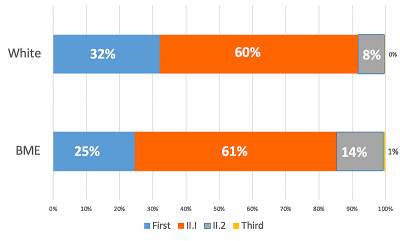Vice Provost's View: Towards an inclusive education: eliminating UCL’s ‘awarding gap’ in five years
24 October 2019
Professor Anthony Smith, Vice Provost (Education and Student Affairs) writes about ways of breaking down the barriers to success for BAME students at UCL.

We want every UCL student to succeed, regardless of their background, experience or stage of learning.
But how do we do this?
To be truly inclusive, we need to understand and breakdown the barriers to success that persist in our institution. These are complex and often interdependent. They require us to resolve to start addressing them now and to recognize that some will take some years to get right.
For example, we are tackling the accessibility of our teaching materials and of the campus itself; building our capacity to support students living with poor mental health; introducing a way of analyzing our assessment so that everyone has the opportunity to succeed and no one is disadvantaged.
Differentials in degrees awarded to Black, Asian and minority ethnic (BAME) students
One of our priorities is to eliminate the differentials that still exist in First and Upper Second Class degrees awarded to different ethnic groups. This gap has been referred to as the ‘BAME attainment gap’. Indeed, our project to eliminate the gap was initially called the BME Attainment Project.
However, rather than recognizing the multiple factors – including institutional structures and discrimination - that contribute to the success of our students, the term BME attainment implies that the responsibility for inequality in attainment lies with the students themselves.
We refute this student deficit model, and as a result we are now referring to the BAME awarding gap and the BAME Awarding Gap Project instead. This is not mere semantics. It characterizes our whole approach to eradicating this unacceptable inequality in outcomes for students.
What we know about the BAME awarding gap at UCL
Analysis of UCL data shows that there is a statistically significant discrepancy in the rate of good degrees awarded to UK Black, Asian and minority ethnic (BAME) students compared with UK White students, despite entering UCL with the same high entry qualifications.
While UCL students, whether white or BME, tend to perform well above national benchmarks, this awarding gap has persisted over the last ten years.
Looking at degrees awarded over the period 2009/10 to 2017/18 (see the table below); we can see that:
- 1st class degrees awarded: 32% of White student’ vs 25% of BAME UK students, a 7% gap which is statistically significant
- 2:1: White 60% BAME 61% - no significant difference
- 2:2: White 8% BAME 14%
Further analysis to investigate this gap, looking at entry characteristics of UCL students and their backgrounds, largely failed to provide an explanation, so we conclude that this is the result of discrimination.
Undergraduate BAME awarding gap at UCL

An inclusive curriculum benefits all students
This difference in outcomes is unacceptable, as is the fact that our Black and minority ethnic students are consistently much less satisfied with the teaching, academic support and feedback they receive.
Recent research into teaching, learning and assessment shows that delivering an inclusive curriculum – that ensures every student, regardless of background, can participate fully - has a positive effect on the experience and outcomes of all students.
Examples of inclusive education at UCL include:
- students working with staff to co-create a module titled ‘Decolonising Anthropology’, following a paper the students produced on the diversity of the taught curriculum.
- 'Who Are You?', a course designed by Institute of Education’s Dr Victoria Showunmi, which looks at what it means to be white and the concept of privilege and celebrates the diversity of backgrounds in the class.
- ‘Black Germany’, a course covering the experiences of black people in Germany since the Middle Ages, developed and run by UCL School of European Languages, Culture and Society with the universities of Missouri and Michigan.
What we’re doing about it
A project team has been working to address the BAME awarding gap at UCL. Dr Julie Evans, Faculty Tutor in Brain Sciences, and Paulette Williams, Head of Student Success Projects in the Office of the Vice-Provost (Education and Student Affairs), have been leading the work.
The first eighteen months of the project have seen an investigation into the gap at UCL, and raising awareness and building advocacy and expertise across UCL.
The team developed UCL’s Inclusive Curriculum Health Check so that departments could reflect on the inclusivity of their programmes for every aspect of the academic cycle, from module content to student engagement to assessment. The project team has responded to 82 submissions from departments to the 2018-19 Annual Student Experience Review, and the team is now working through the PGT ASER submissions. One output of this work has been a top tips document, which will form part of the toolkit for inclusive education to be published in January 2020.
The team also piloted a new strand of the Student Quality Reviewer scheme, where Student Curriculum Partners review the inclusivity - particularly in relation to race and ethnicity - of teaching materials, such as programme handbooks, module guides and reading lists.
There is growing interest in this work from other universities, and the team has been sharing the project to several institutions, including Oxford, which is adopting our Inclusive Curriculum Health Check.
Eliminating the gap by 2024
Our data show we are making some progress but we are impatient. We want to eliminate the BAME awarding gap within 5 years. Our main focus this year is on building our capacity to close the gap – please see below several ways in which you can get involved.
Eliminating the gap by 2024 is an ambitious target, but I hope we all have the commitment to achieve this crucial milestone in our journey towards inclusivity.
8 ways you can help to eliminate the award gap at UCL
- Work with your Dean to support their pledges and with your Vice-Dean for Equality, Diversity and Inclusion) to drive policy changes
- Work with your BAME Attainment faculty lead (title under review) to engage with the work that is going on in your faculty
- Work with your student academic reps to monitor progress on the actions from the UCL Inclusive Curriculum Healthcheck you completed as part of the ASER and set targets in your new ASER plan that improve inclusion (see Ros Duh’s ‘Thirteen proven approaches to enhance the outcomes and experiences of our students, whatever their background’)
- Through the Student Quality Reviewer scheme, work with Student Curriculum Partners to get a student view on how your teaching can include more diverse perspectives.
- Work with Arena on your teaching methods – research shows that the choice of teaching methods has substantial effects on achievement of all students.
- Get inspired by our case studies and our resource bank that brings together best practice on inclusive teaching from around the world.
- Recognize and celebrate outstanding contributions to this work, by nominating colleagues for two new UCL Education awards (provisionally called Provost’s Eliminating Differential Attainment Award and an Education Success for All Award.
- Get involved with the project by contacting the team.
Read about UCL’s participation in the Race Equality Charter.
 Close
Close

